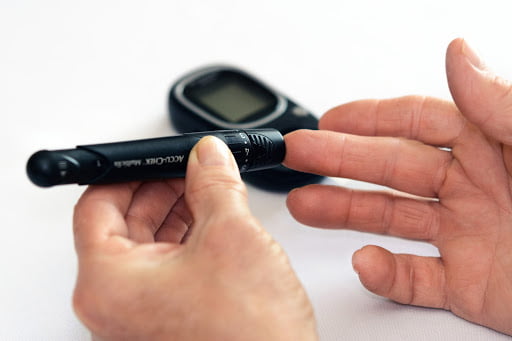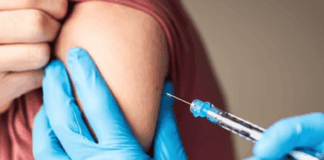
Written By Guest Writer Wendy Dessler,
Diabetes is a disease that impacts more than 100 million American adults, consisting of type one diabetes, type two diabetes, and prediabetes, according to the CDC.
Fortunately, diabetes is manageable with the right combination of medication and lifestyle changes. By adjusting your lifestyle, you can limit the impacts of type one diabetes, reverse the impacts of type two diabetes, and prevent prediabetes from developing any further. Here are five food and lifestyle tips for controlling your diabetes, no matter what stage.
Be Proactive with Checkups
Diabetes impacts different areas of the body. Your eyes, limbs, and internal organs are all at risk from the impact the disease has on your blood vessels. That means being proactive in booking your checkups, sticking to the schedule outlined by your doctor. Many of the impacts of diabetes don’t have noticeable symptoms, so skipping appointments is to be avoided at all costs.
For example, regular eye examinations are essential. Diabetes can cause glaucoma and cataracts, as well as other diabetes-related side effects. Many of the issues are imperceptible until it’s too late to put corrective protocols in place.
Additionally, seeing a podiatrist regularly to have your feet checked is another essential checkup for diabetes patients, especially if cuts or numbness occur between appointments.
If you have diabetes, you’ll need coverage. Take some time to find out more about Vision Insurance and other specialist coverage options so that you’re able to prioritize your health without excess stress about finances.
Prioritize Stress Management
Speaking of stress, the importance of stress management cannot be understated when you have diabetes. Yes, life is stressful. If you have a high-pressure career or a lot of extra responsibility, cutting the stress out of your life isn’t always possible. Instead, you need to learn ways to cope with your stress and let it go.
When you’re stressed, your body releases cortisol and glucagon. These stress hormones directly impact your blood sugar levels and can cause a spike. If you are continuously stressed, you will have a hard time regulating your blood sugar levels and managing your disease.
Find an activity that helps you reduce stress. Taking time away to relax can be helpful, as well as taking up mindfulness-based exercises like yoga and meditation. Being physically active can also burn off stress quickly and efficiently.
Exercise More
To manage your disease, you need to make time for exercise. In addition to burning off stress, exercise can increase your insulin sensitivity and help your body process sugars more effectively.
Don’t let the idea of starting an exercise routine overwhelm you. Exercise has a dose effect, meaning that even a little bit will make an impact. Start with five minutes of focused movement each day. After a week, increase it to ten minutes, then fifteen, and so on. Find an exercise that you enjoy, whether it’s weight lifting or going for a long walk.
One important thing to remember when starting an exercise routine is to monitor your blood sugar levels surrounding your workout as you might need an extra snack to sustain you.

Get Your Nutrition in Check
Eating a healthy diet is one of the best ways to combat illness and offset the impacts of any disease. For diabetes, there are special alterations to consider, such as limiting foods that have a high glycemic index and cutting back on processed carbohydrates.
Start by focusing on portion control and replacing starchy carbs with vegetables. Consider working with a registered dietician to help create a nutrition plan that suits your needs.
Add More Fiber to Your Diet
Did you realize that fiber helps to slow down the digestion of carbs and the sugar absorption process? Increasing the amount of fiber in your diet can help you avoid spikes in your blood sugar after a meal. Most people fail to realize fibers come in soluble and insoluble forms. Ideally, you want to choose soluble fibers due to the ability they have to naturally lower blood sugar levels.
Not only can increased amounts of fiber help type 2 diabetics, type 1 diabetics can benefit from it as well. People who suffer from type 1 diabetes can use fiber to help reduce the chances of low blood sugar levels. Fiber can also help these same people improve their control of blood sugar levels.
Increasing the number of vegetables, legumes and whole grains you consume is an excellent way to get more fiber in your system. Women should get around 25 grams of fiber each day, while men need up to 38 grams of fiber.
Portion Control is Imperative
Regulating the number of calories you consume on a daily basis is crucial whether you are trying to control your blood sugar or lose weight. While properly portioning out your meals will be difficult at first, you will get the hang of it eventually.
When trying to control food portions, consider doing things like:
- Keeping a food journal
- Check food labels and recommended serving sizes
- Weigh and measure all of your portions
- Try slowing down when you eat
Working on controlling your portion sizes will have a positive affect on your weight and your blood sugar levels.

Source-Pexels
Consider the Benefits of Apple Cider Vinegar
Some people fail to realize that the benefits of apple cider vinegar are not just an old wive’s tale. Consuming more apple cider vinegar helps to reduce the amount of sugars produced by your live. This in turn, will lead to lower blood sugar levels on a consistent basis. Not only can apple cider vinegar help with blood sugar production in the body, it can also increase the body’s sensitivity to insulin.
There are a number of ways to get this substance into your body. For instance, you can mix two teaspoons of apple cider vinegar into an eight ounce cup of water. If this doesn’t sound appealing to you, try either finding salad dressing with apple cider vinegar in them or making your own.
Before you start consuming this type of vinegar, be sure to consult with your primary care physician. If you are already taking medication to lower your blood sugar, you may not be able to take apple cider vinegar.
Get Enough Water and Rest
Hydration and sleep both play important roles in managing illnesses, be it something as serious as diabetes or banal as a cold. Sleep and hydration play a key role in hormonal regulation, digestion, and healing in the body.
Hydration, in particular, can help flush excess sugars from your system. Both sleep and hydration also help mitigate stress and assist with weight management, creating an exponential effect on controlling your diabetes through lifestyle changes.
You may never be cured of diabetes, but by making healthy lifestyle changes, you can limit the symptoms and even reduce the amount of medication you take (with guidance from your doctor). Take the changes one day at a time to create sustainable habits that lead to health.
Disclaimer: We at Prepare for Change (PFC) bring you information that is not offered by the mainstream news, and therefore may seem controversial. The opinions, views, statements, and/or information we present are not necessarily promoted, endorsed, espoused, or agreed to by Prepare for Change, its leadership Council, members, those who work with PFC, or those who read its content. However, they are hopefully provocative. Please use discernment! Use logical thinking, your own intuition and your own connection with Source, Spirit and Natural Laws to help you determine what is true and what is not. By sharing information and seeding dialogue, it is our goal to raise consciousness and awareness of higher truths to free us from enslavement of the matrix in this material realm.
 EN
EN FR
FR


























Dr. Matthias Rath says that the major bodily damage from diabetes is due to the fact that glucose and vitamin C both enter your cells through the exact same receptors. This means that if your blood glucose is out of control (high), it crowds out the vitamin C from entering your cells and produces an effective vitamin C deficiency, even if you are getting normal amounts of vitamin C. This is why the damage from diabetes (heart disease, diabetic ulcers, etc) is the same as the effects of scurvy (severe vitamin C deficiency). One solution is to take larger amounts of vitamin C to balance out the high blood levels of glucose (plus other nutrients as well, such as lysine to help repair scurvy-damaged tissues–please refer to Dr. Rath’s websites for more info).
Type 2 diabetes is curable by avoiding any kind of refined carbs (white bread, white flour pasta, white rice, all forms of sugar especially corn syrup and agave syrup, alcohol too which is also basically a refined carb). I have been pre-diabetic for 20 years, I tolerate sweets poorly, especially on an empty stomach!! But I am not diabetic nor will I ever be, because I severely limit my consumption of the toxic substances known as refined carbs.
Type 1 diabetes may not be curable with available technology, but eliminating refined carbs and following Dr. Rath’s advice can prevent all of the harmful consequences of diabetes from ever occurring. Please feel free to google him and learn from him!
Thank you for that information I really need help I am type 2